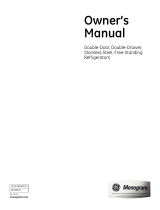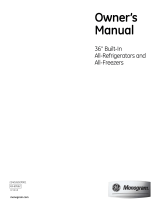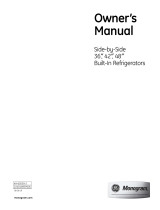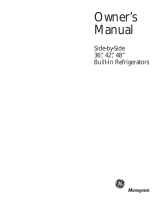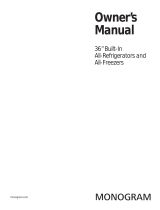8
Operating Instructions
Bottom Mount Refrigerator
Set the
temperature
controls
Your refrigerator has two controls that let you
regulate the temperature in the fresh food and
freezer compartments.
They have settings from 1 through 9,
and are located at the top of the fresh food
compartment.
The freezer control also has an OFF setting.
9 is the coldest setting, 1 is the warmest.
WHEN YOU FIRST TURN THE
REFRIGERATOR ON, SET BOTH
CONTROLS AT 5.
For colder or warmer temperatures, adjust
the desired compartment control one number
at a time.
IMPORTANT: When first setting controls,
or adjusting them, allow 24 hours for the
refrigerator to get cold.
NOTE: Turning the freezer control to the
OFF position stops cooling in BOTH
compartments— fresh food AND freezer—
but does not shut off power to the refrigerator.
How to test
temperatures
Use the milk test for the fresh food
compartment. Place a container of milk on the
top shelf in the fresh food compartment.
Check it a day later. If the milk is too warm or
too cold, adjust the temperature controls.
Use the ice cream test for the freezer
compartment. Place a container of ice cream in
the center of the freezer compartment. Check
it after a day. If it’s too hard or too soft, adjust
the temperature controls.
Always allow 24 hours for the refrigerator to
reach the temperature you set.
Energy saver
switch
The energy saver switch is located on the
temperature control panel.
To reduce the amount of electricity required
to operate your refrigerator, push switch to
ENERGY SAVER setting.
This turns off the heater in your refrigerator
that prevents moisture from forming on the
outside of the refrigerator.
With the heater turned off, there is a chance
that moisture may form on the outside of your
refrigerator, especially when the weather is
humid.
The humidity is most likely to be high in the
summer, in the early morning hours, and in
homes which are not air conditioned.
Over an extended period of time, moisture that
forms on the refrigerator surface may cause
deterioration of the paint finish. It will be
important to protect the finish by using
appliance polish wax as described in the Care
and Cleaning section.
Move the energy saver switch from the
ENERGY SAVER setting and electricity flows
through the low wattage heater which warms
the outside of the refrigerator. Under most
conditions, this prevents the forming of
moisture or water droplets.




















